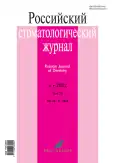The study of the impact of the introduction of self-isolation and the mandatory wearing of personal protective equipment on oral hygiene
- Authors: Gus’kov A.V.1, Mishin D.N.1, Kalinovskiy S.I.1, Rodina T.S.1, Smirnova A.V.1, Osman A.1
-
Affiliations:
- Ryazan State Medical University named after Academician I. P. Pavlov
- Issue: Vol 26, No 3 (2022)
- Pages: 247-256
- Section: Organization of Healthcare Service
- Submitted: 16.11.2021
- Accepted: 06.07.2022
- Published: 28.09.2022
- URL: https://rjdentistry.com/1728-2802/article/view/88144
- DOI: https://doi.org/10.17816/1728-2802-2022-26-3-247-256
- ID: 88144
Cite item
Abstract
BACKGROUND: The availability of medical facilities, and as a result, the possibility of receiving medical care has decreased due to the announcement of quarantine in several countries. An untimely request for dental care entails a change in the CPI index (the sum of teeth on which caries, a filling or a tooth has been removed), resulting in partial or complete loss of teeth. The complete absence of teeth is accompanied by morphofunctional changes in all elements of the dental system, a significant decrease in chewing ability. Thus, the decrease in public attention to dental hygiene and treatment in dental clinics for examination and treatment negatively affected dental health.
AIM: The aim is to assess the impact of the introduction of self—isolation and mandatory wearing of personal protective equipment on oral hygiene of students of higher educational institutions of Ryazan and the Ryazan region and foreign universities (universities).
MATERIAL AND METHODS: The research materials were the results of a survey conducted among Russian students and students living outside the Russian Federation. A total of 397 students (English speakers – mainly India, Egypt, Canada; French speakers – mainly Morocco, Lebanon, Tunisia), who were divided into several study groups. In total, 397 students took part in our study (42% were girls, 58% were young people), 123 of them were Russian-speaking students, 120 English-speaking students and 154 French-speaking students.
RESULTS: A comparative assessment of the results of the study showed a positive state of oral hygiene in the majority of respondents, and there was an increase in interest in the use of additional personal hygiene products of the oral cavity (chewing gum, irrigators, rinses, single-stick brushes, toothpicks, etc.).
CONCLUSION: In general, oral hygiene, being an integral part of daily care, was not forgotten during self-isolation. Students regularly brushed their teeth, used additional means, but, as the study showed, students went to the dentist less often due to compliance with the self-isolation regime.
Full Text
About the authors
Aleksandr V. Gus’kov
Ryazan State Medical University named after Academician I. P. Pavlov
Author for correspondence.
Email: guskov74@gmail.com
ORCID iD: 0000-0001-9612-0784
MD, Cand. Sci. (Med.), Associate Professor
Russian Federation, RyazanDmitry N. Mishin
Ryazan State Medical University named after Academician I. P. Pavlov
Email: dimnar89@ya.ru
ORCID iD: 0000-0002-4966-9050
MD, Cand. Sci. (Med.), Assistant
Russian Federation, RyazanSergey I. Kalinovskiy
Ryazan State Medical University named after Academician I. P. Pavlov
Email: kalinovskiysi@yahoo.com
ORCID iD: 0000-0002-6222-3053
Russian Federation, Ryazan
Tatyana S. Rodina
Ryazan State Medical University named after Academician I. P. Pavlov
Email: kalinovskiysi@yahoo.com
ORCID iD: 0000-0002-7678-0029
MD, Cand. Sci. (Med.), Associate Professor
Russian Federation, RyazanAleksandra V. Smirnova
Ryazan State Medical University named after Academician I. P. Pavlov
Email: smirnovaalexa109@incloud.com
ORCID iD: 0000-0002-6412-0672
Russian Federation, Ryazan
Abbas Osman
Ryazan State Medical University named after Academician I. P. Pavlov
Email: abbasothman@mail.ru
ORCID iD: 0000-0002-4898-2053
Russian Federation, Ryazan
References
- Ustinov AL, Naboychenko ES, Chuprakova SV. Man in the conditions of global pandemics: a historical and psychological review. Personality in a changing world: health, adaptation, development. 2021;9(1):7–17. (In Russ).
- Ershov KA, Sevbitov AV, Shakaryants AA, et al. Evaluation of elderly patients adaptation to removable dentures. Nauka molodykh (Eruditio Juvenium). 2017;5(4):469–476. doi: 10.23888/HMJ20174469-476 (In Russ).
- Oral hygiene affects the accuracy of COVID-19 tests. Dental Magazine. 2020 Aug 6. Available from: https://dentalmagazine.ru/posts/gigiena-polosti-rta-vliyaet-na-tochnost-testov-na-covid-19.html. Accessed: June 3, 2022. (In Russ).
- Borodovitsina SI, Savelyeva NA, Tabolina ES. Prevention of dental diseases: textbook. Ryazan: OTSiOP; 2019. 264 p. (In Russ).
- World Health Organization. Use of masks in the context of COVID-19. Temporary recommendations. June 5, 2020 [Internet]. Available from: https://apps.who.int/iris/bitstream/handle/10665/332293/WHO-2019-nCov-IPC_Masks-2020.4-rus.pdf. Accessed: June 3, 2022. (In Russ).
- Israpilov Kh. Pandemic 2020. Samizdat; 2020. P:20–23. (In Russ).
- Kuzmina EM, Yanushevich OO. Therapeutic dentistry: textbook. Moscow: Prakticheskaya meditsina; 2017. P:115–119. (In Russ).
- Lutskaya IK. Practical dentistry: a reference guide. Minsk: Belaruskaya nauka; 1999. 360 p. (In Russ).
- Fleisher GM. Oral hygiene. LAMBERT Academic Publishing; 2019. P:3–12. (In Russ).
- Ehgartner B. The collapse of hygiene. How the war on germs destroys our immunity. Saint Petersburg: Piter; 2018. P:231. (In Russ).
- Berutti E. WaveOne Instruments: Disposable Endodontics — The New Standard of Treatment. Dental journal. 2012;13(3):255–257. (In Russ).
Supplementary files




















